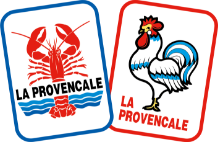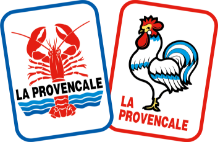

The AOP and the IGP are two official quality signs created in 1992 and reserved for typical products anchored in a region that gives them a specific character and an inimitable flavor. They guarantee the authenticity of products made according to traditional know-how.
With the AOP, the product is entirely developed in its region of origin, from the production of its raw material until its final realization.
With the IGP, at least one production stage must take place in its region of origin.

An organic farming label is a certification of the production method of organically grown products. For the organic food industry, any company involved can be certified, including seed companies, farmers, food manufacturers, distributors and restaurateurs.

Demeter is the international certification brand for biodynamic agriculture. It ensures that biodynamic practices in the agricultural fields are respected, as well as respect for the quality of these products during their processing.
The Demeter specifications are stricter than the European organic regulation (mixed prohibited farms, prohibited cytoplasmic male infertility, fewer allowed inputs, stricter wineification specifications...).
Today, Demeter specifications cover a full range of products: food, cosmetics and textiles and the Demeter brand is present in 60 countries.




These logos represent the main labels certifying that a product is a fair trade product.
Fair Trade is a trade partnership based on dialogue, transparency and respect, with the aim of achieving greater equity in world trade. It contributes to sustainable development by providing better trading conditions and guaranteeing the rights of marginalized producers and workers, particularly in the South of the world.

Label Rouge is a national sign that refers to products that, by their production or manufacturing conditions, have a higher level of quality compared to other similar products usually marketed.
The high quality is based on:
- Production conditions, which differ from the production conditions of similar products usually marketed
- The image of the product in relation to its production conditions, the presentation or service elements

The "Made in Luxembourg" label assures consumers of the Luxembourg origin of the product or service for which it was granted. It is granted independently by the Chamber of Commerce or the Chamber of Trades, which ensures its relevance.

Created in 1995, the label "Product of the Terroir - Lëtzbuerger Wees" (Luxembourg wheat) brings together all the players in the production chain of baked goods: farmers, traders, millers, bakers. In particular, it ensures that all wheat and rye products are 100% from the Luxembourg fields and that their cultivation and processing take place under strict conditions.

Companies with this logo are committed to:
- meet a maximum content of 20 mg/kg of residual gluten in each product
- have independent laboratories perform the analysis of residual gluten in the finished product with the eLISA R5 Méndez referenced test in codex Alimentarius
- conduct an audit at the AOECS Standard at the manufacturing site of gluten-free products
- submit the results of the analyses and audit to AFDIAG's control at least once a year
As permitted by European regulations, some logo products may contain wheat starch, provided that the residual gluten threshold on the finished product is less than 20 mg/kg.

The Vegan Society is a charity founded in England, mainly by Donald Watson and Elsie Shrigley, on November 1, 1944. Donald Watson creates the term "vegan" to represent vegetarians who do not consume dairy products or eggs and thus distinguish with other forms of vegetarianism.

